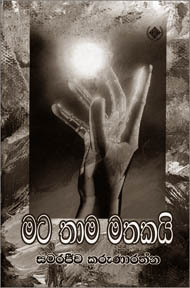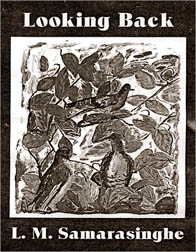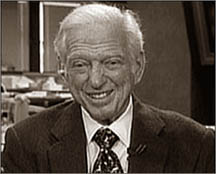 Only crumbs of cream crackers under the carpet Only crumbs of cream crackers under the carpet
Mata Thama Mathakai
Author: Samarajeeva Karunaratne
Publisher: Wijesooriya Grantha Kendraya
Price: Rs. 400
by Aditha Dissanayake
For someone who has never written a word in Sinhala before this, as
claimed by Professor Kusuma Karunaratne, Professor Samarajeeva
Karunaratne has surely met the highest expectations of all critics with
his autobiography - Mata Thama Mathakai (I still remember).
Thankfully lacking the three essentials, which according to P.G
Wodehouse make an autobiography,- "its compiler shall have an eccentric
father, a miserable misunderstood childhood and a hell of a time at his
public school", the book unravels surreal comedy, day in day out in the
opening chapters.
 Of special interest is the opening page, where, sans introductions,
sans preambles, the story begins as if the writer is simply continuing a
conversation he had begun sometime ago with the reader. "Budung Akka,
that's my second sister. Of special interest is the opening page, where, sans introductions,
sans preambles, the story begins as if the writer is simply continuing a
conversation he had begun sometime ago with the reader. "Budung Akka,
that's my second sister.
When people have two sisters they usually call one Loku Akka and the
other Podi Akka, but I called my Podi Akka, Budung Akka..." thus you
begin the journey back into the past.
Reading about the embarrassments, the pranks, the sibling rivalry of
his childhood it becomes obvious Professor Sam Karunaratne couldn't be
dull if he tried.
His portraits of the teachers of his school days, Miss Nelly who
called him Chutta, and Mrs. Janson who threatened those in her class
with "I'll break you by your neck and dash you on the floor" whenever
someone failed to give an answer are immensely entertaining - so too the
scrapes he gets into, especially the one where he earns himself the
nickname "Jongi Baba" - here are powerful stories that remain, after all
these years, a testament to the colourful character of its creator.
Recalling his days at the Technical College, Maradana he writes about
a conversation he had had with his friend Charles Robertson " I say Karu
why are you here?" "Well I'm on my way home", What makes you come home
at this time, when everybody is heading towards Colombo" "For what?" "To
see the Queen you fool.
You are a damn fool to come home when everybody is rushing to Colombo
to see the Queen". Feeling insulted he says " Look Mr. Charles
Robertson, I am not going to look at the Queen by standing on the
way-side like you. If I have to see the Queen, I have to get a proper
invitation from the Queen herself. then only will I see her".
Yet, even though he is marvellous in his self-deprecating charm, this
kind of dead-pan narration is understandably hard to sustain over 335
pages.
And so, once the story gets closer and closer to the present the
breathtaking quality diminishes and the visit to Princeton, the chapters
dealing with econometrics and linear programming etc, need to be taken
in small doses - small does that turn out to be quietly funny and at
times very moving.
Recording the sadest event of his life in the 1990s as the passing
away of his mother in 1994, he writes even though he was fifty eight at
the time he had felt like a motherless baby, sad and lonely. He
reproduces the condolence message sent by Dr. Arthur C. Clarke "My Dear
Sam, Remember that you knew her, not that you lost her".
Coming to the last few chapters it becomes evident that every line in
the verse dedicated to him, on the day he completed 25 years of service
as the Professor of Electrical Engineering by his students at the
University of Moratuwa is true" High in potential, but
down-to-earth/facing surges, not breaking down/shining bright and
friendly indeed/You were here Sir, we are proud of you".
Yes, for someone who has never written anything in Sinhala before
this, Professor Karunaratne's memoir, over flowing with captivating
prose, is a compelling read. Especially because when he lifts the carpet
you discover only crumbs of cream-crackers.
[email protected]
Once upon a time
by Dr. W. M. K. Wijetunga
Looking Back
Author: L. M. Samarasinghe
Published by: Vijitha Yapa Book Shop (Pvt) Ltd.
Retiring senior public servants continue to be a perennial source of
interesting writers of their memories, both in Sinhala and English. For
the lack of a knowledge of Tamil, I am not well acquainted with any
writing in Tamil, although many persons of the Tamil community have held
very senior positions in the public service with great distinction.
 L. M. Samarasinghe better known simply as "Sam" follows a more
restrictive path in looking back on his past. He confines himself
strictly to his services as a DRO, Assistant Commissioner of Local
Government, Secretary to the Leader of the House of Representatives, and
finally, as the Land Commissioner. L. M. Samarasinghe better known simply as "Sam" follows a more
restrictive path in looking back on his past. He confines himself
strictly to his services as a DRO, Assistant Commissioner of Local
Government, Secretary to the Leader of the House of Representatives, and
finally, as the Land Commissioner.
During his stint as the Secretary to Hon. Mr. Maitripala Senanayake,
Sam had come into very close contact with the political establishment.
For this discretion, he had to pay a heavy price with the change of
government in 1977.
He was banished to the 'pool', a veritable public service waste-land.
However, he did not languish long in this forced hibernation, and was
able to re-emerge with even greater vigour, as the Land Commissioner, a
much coveted position at all times. With that his state service came to
an end in the tumultuous year of 1983.
During his later years in the S.L.A.S. he had made many close
contacts with many international NGOs, active at the time, locally and
globally. With his intimate and hands-on experience in working with
rural people in particular, his shift to the NGO sector was inevitable.
And in this new capacity also he has performed with great maturity,
tenacity and distinction.
It is no surprise that having left behind his indelible finger and
foot prints, in many fields, both here and abroad, as he is closing on
80 years of age, Sam could Look Back with great satisfaction and a true
sense of self-fulfilment, in having done his bit, like the proverbial
little sparrow, which tried to save the world from the sky that was
coming crashing down.
Reading about all his achievements, with many illuminating anecdotes,
one is reminded of the title (but not the contents) of Arundathi Roy's
well known book (God of Small Things).
When many senior public servants were drawn like magnets to
spectacular projects of massive proportions, often of dubious benefit,
but with the likelihood of considerable personal benefits, Sam was more
than content dealing with lesser things, which were of immediate benefit
to those in dire need and redress.
This was a time (as much as of today) when many up and coming public
servants were chasing after fabulous dowries, and influential and
potentially lucratic positions in more congenial locations, particularly
Colombo or abroad.
On the other hand, Sam hardly refers to his wife and children, except
in passing, or to convoys of comfortable state and private vehicles, and
participation in glittering social events.
To my recollection, at the time he said 'good-bye' to the public
service, as a true and obedient servant of the people, he was the proud
owner of a battered Volkswagen, which carried many scars of its constant
use on our roads.
He has always lived a simple and Spartan life, often sharing his
sparce accommodation with others in similar circumstances. I still
recall the few times I was Sam's guest in Bangladesh and Bangkok,
Thailand.
Part of Sam's success and contentment lies in the fact that he often
had understanding and appreciative superiors, who were always supportive
of his work, much of which would have been dismissed by some others as
Sam's idiosyncrasies.
The more perceptive superiors would have seen in him a person with an
uncomplicated lifestyle, and who was taking things as they came along,
and not given to complaints, endless demands and recriminations. Sam
would often forego his own comfort and wellbeing, for the relief of
those in greater need and distress, in the true spirit of Meththa,
Karuna, Mudhitha and Upekkha.
An important characteristic of Sam was his ability and the
willingness to put his shoulder to any task at hand, however small or
substantial, with or without the necessary tools.
If the latter was not readily available, Sam would use his ingrained
ingenuity into improvisation, a virtue, which would be hard to come by,
among most of his peers, or those who came after him.
A public servant's life, whether single or married, when posted to
the rural outposts, during the pre 1970s, was often divided between work
and pleasure, with the latter often taking the form of social drinking,
hunting, card-playing, gossiping, sports and so on.
For those inclined (often most males), the Public Service Club (PSC)
was the focus on their social life. Sam, on the other hand, as a
practising Buddhist, had used his first opportunity to get the consent
of his superiors, to dispense with the use of alcohol, at least in one
of the more popular watering places in the sacred city of Anuradhapura.
With advancing age, he had to leave government service, and like a
duck taking to water, he plunged into the deep end itself, in throwing
his experience and skills into the world of NGOs and INGOs, which were
no strangers to him. In this new area also, he was able to reach new
heights, including a close institutional association with the World
Bank.
As one looks back on his public service days, one seems to miss some
of his experience and perceptions on the important transition from the
elite CCS to SLAS, and its impact on both the people, the most
'important' stakeholder, as well as the public service itself, another
critical stakeholder.
Other matters, which have escaped his attention and reminiscences,
are the periodic elections, in which the public service was a crucial
player, and lastly the traumas of 1971 and 1983.
The value of Sam's "Looking Back" would have been enhanced by at
least a short index of at least the proper names, of people and places.
Farewell to Sidney Sheldon
 Author of many best selling novels("If tomorrow comes"Rage of
Angels," "The Other Side of Midnight,""Master of the Game"...) Sidney
Sheldon, succumbed to complications from pneumonia at Eisenhower Medical
Center in Rancho Mirage on January 29, with his wife, Alexandra and
daughter Mary at his bedside. Author of many best selling novels("If tomorrow comes"Rage of
Angels," "The Other Side of Midnight,""Master of the Game"...) Sidney
Sheldon, succumbed to complications from pneumonia at Eisenhower Medical
Center in Rancho Mirage on January 29, with his wife, Alexandra and
daughter Mary at his bedside.
A writer who had lived a life filled with fortitude and self-doubt,
reversal and triumph from anxiously watching his first novel hit
bookstores to being hailed as the world's most translated author by The
Guinness Book of Records, at the age of eighty nine when he breathed his
last breath, he had lived a life filled with highs and lows, twists and
turns, as riveting as any blockbuster he had ever written.
Having grown up in Chicago during the days of the Depression in his
autobiography, The Other Side of Me, he writes about his family's
poverty, and the onset of mood swings, later diagnosed as manic
depression, that would haunt him throughout his life.
Every reader knows that a Sidney Sheldon novel is a guaranteed
page-turner. Cleverly plotted with a high degree of suspense and
sensuality he had once explained in an interview "I try to write my
books so the reader can't put them down.
I try to construct them so when the reader gets to the end of a
chapter, he or she has to read just one more chapter. It's the technique
of the old Saturday afternoon serial: leave the guy hanging on the edge
of the cliff at the end of the chapter."
Commenting on his women protagonists he had explained ""I like to
write about women who are talented and capable, but most important,
retain their femininity. Women have tremendous power - their femininity
- because men can't do without it."
Never having written for highbrow critics, Sheldon yet, paid great
attention to the authenticity of his novels. He remarked in 1987: "If I
write about a place, I have been there. If I write about a meal in
Indonesia, I have eaten there in that restaurant. I don't think you can
fool the reader."
For "Windmills of the Mind," which dealt with the CIA, he had
interviewed former CIA chief Richard Helms, traveled to Argentina and
Romania, and spent a week in Junction City, Kansas, where the heroine
had lived.
Married for more than 30 years to Jorja Curtright Sheldon, a stage
and film actress who later became a prominent interior decorator, after
her death in 1985, he tied the knot with Alexandra Kostoff, a former
child actress and advertising executive, in 1989.
"I love writing books," he commented. "Movies are a collaborative
medium, and everyone is second-guessing you. When you do a novel you're
on your own. It's a freedom that doesn't exist in any other medium. |


